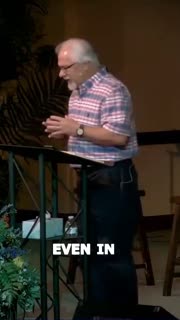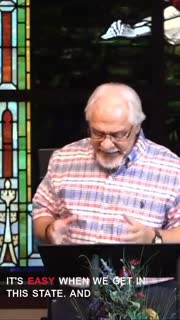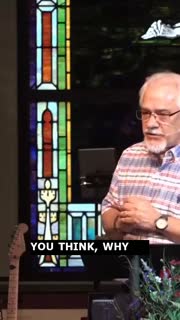Finding Faith Amid Doubt: Asaph's Journey
Devotional
Sermon Summary
Bible Study Guide
Sermon Clips
### Quotes for Outreach
1. "When you start thinking that, and that even in Christianity, it's hard. It's hard living your life in these days. The title of the message is, Why Me, Lord? Why me? Have you ever felt that way? Why me, Lord? You know, I've had people say to me, Pastor Lou, you just have bad luck. You just have bad luck. And I say to them, I don't believe in bad luck. And they say, maybe you should start believing in bad luck." [02:15] (30 seconds)
2. "We talk about praying for nation. We talk about praying for the world. And what we're really saying is pray for individuals. Because our nation is made up of individuals. Our world is made up of individuals. And we need to be praying for people, regardless of who they are, where they live. We need to be praying for them." [01:29] (18 seconds)
3. "The prosperous are those who are serving God every day. The prosperous are those who are right now up in these rooms being terrorized by little children so that you can sit here and hear this sermon. Many of them seek counseling. Not my little child. Yes, yours. Yeah, I find them many times after the service on Sunday, babbling and walking around the halls and we have to lead them out." [23:58] (36 seconds)
4. "Keep on keeping on. Keep on praying. But I don't feel like keep on praying. Keep on getting in his word. Keep on crying out to him. Because he is God. And the next time you think, why me? Think about what Jesus did on the cross. He shed his very blood for the forgiveness of your and my sin. He gave his life and died and conquered the grave so that we could live forever if we would trust him." [32:03] (36 seconds)
5. "Go home and tell them the great things that I have done for you. And this is what I'm telling you this morning. Go home. Go home. Get up and go home. And tell the people in your life the great things that God has done for you. And the forgiveness that he will bring if they will simply cry out to him. Trust in his shed blood that he gave at Calvary. And invite him into their life. Go home and tell them." [33:58] (38 seconds)
### Quotes for Members
1. "Asaph hung on. He did something right here. He looked around at the world. He looked around at himself. He had so many questions. He was confused. He didn't know what to do. He looked and he had so many questions. But you know where he looked for his answers? He looked to God for his answer. And what God did was he said, Asaph, I'm going to peel back the veil a little bit here. I'm going to show you a little glimpse from heaven." [30:58] (29 seconds)
2. "A veil of doubt. Excuse our view of God. We begin to see of him, see him, think of him. In a different way than it is the truth of the Bible. Years ago, my first message I ever preached was nightmare on pig street. First message ever. And it's kind of neat because my daughter just had the baby and Terry was in the hospital with Nicole to have her. The day I was supposed to preach. So I was up all night in the hospital. Those contractions are. I'm telling you, they were rough getting through them." [15:28] (42 seconds)
3. "It's easy when we get in this state. And I'm talking about believers. It's easy when we get in this state. It's easy to get down. It's easy to get anxiety. It's easy to get into severe depression. Now, sometimes, anxiety and depression, it's something that's neurological. And we've got to get some medication and stuff to work with. I understand that, and we should. But, listen, a lot of times, it's just because we look around. We look what's going on in our life, in our family, in our country. And it's like, no, no. And you just begin to deal with heavy anxiety and depression." [09:47] (35 seconds)
4. "I can't handle this. I don't understand God. I've trusted you. I've given my life for you. I've sacrificed and I don't get it. It's in vain. It's for nothing. Why is my health failing? Why is my marriage in trouble? Why am I having such a tough time with my kids? Why is my job so uncertain? Why, why, why, Lord? And I just keep living for you. But look, I've done this in vain." [27:31] (26 seconds)
5. "The next time you think, why me? Think about what Jesus did on the cross. He shed his very blood for the forgiveness of your and my sin. He gave his life and died and conquered the grave so that we could live forever if we would trust him. And whenever you start thinking about all that Jesus did for a sinner, for a sinner like me, then I think, why me? Why me? Why I don't deserve this kind of love from a holy God." [32:57] (40 seconds)
Ask a question about this sermon
1. "When you start thinking that, and that even in Christianity, it's hard. It's hard living your life in these days. The title of the message is, Why Me, Lord? Why me? Have you ever felt that way? Why me, Lord? You know, I've had people say to me, Pastor Lou, you just have bad luck. You just have bad luck. And I say to them, I don't believe in bad luck. And they say, maybe you should start believing in bad luck." [02:15] (30 seconds)
2. "We talk about praying for nation. We talk about praying for the world. And what we're really saying is pray for individuals. Because our nation is made up of individuals. Our world is made up of individuals. And we need to be praying for people, regardless of who they are, where they live. We need to be praying for them." [01:29] (18 seconds)
3. "The prosperous are those who are serving God every day. The prosperous are those who are right now up in these rooms being terrorized by little children so that you can sit here and hear this sermon. Many of them seek counseling. Not my little child. Yes, yours. Yeah, I find them many times after the service on Sunday, babbling and walking around the halls and we have to lead them out." [23:58] (36 seconds)
4. "Keep on keeping on. Keep on praying. But I don't feel like keep on praying. Keep on getting in his word. Keep on crying out to him. Because he is God. And the next time you think, why me? Think about what Jesus did on the cross. He shed his very blood for the forgiveness of your and my sin. He gave his life and died and conquered the grave so that we could live forever if we would trust him." [32:03] (36 seconds)
5. "Go home and tell them the great things that I have done for you. And this is what I'm telling you this morning. Go home. Go home. Get up and go home. And tell the people in your life the great things that God has done for you. And the forgiveness that he will bring if they will simply cry out to him. Trust in his shed blood that he gave at Calvary. And invite him into their life. Go home and tell them." [33:58] (38 seconds)
### Quotes for Members
1. "Asaph hung on. He did something right here. He looked around at the world. He looked around at himself. He had so many questions. He was confused. He didn't know what to do. He looked and he had so many questions. But you know where he looked for his answers? He looked to God for his answer. And what God did was he said, Asaph, I'm going to peel back the veil a little bit here. I'm going to show you a little glimpse from heaven." [30:58] (29 seconds)
2. "A veil of doubt. Excuse our view of God. We begin to see of him, see him, think of him. In a different way than it is the truth of the Bible. Years ago, my first message I ever preached was nightmare on pig street. First message ever. And it's kind of neat because my daughter just had the baby and Terry was in the hospital with Nicole to have her. The day I was supposed to preach. So I was up all night in the hospital. Those contractions are. I'm telling you, they were rough getting through them." [15:28] (42 seconds)
3. "It's easy when we get in this state. And I'm talking about believers. It's easy when we get in this state. It's easy to get down. It's easy to get anxiety. It's easy to get into severe depression. Now, sometimes, anxiety and depression, it's something that's neurological. And we've got to get some medication and stuff to work with. I understand that, and we should. But, listen, a lot of times, it's just because we look around. We look what's going on in our life, in our family, in our country. And it's like, no, no. And you just begin to deal with heavy anxiety and depression." [09:47] (35 seconds)
4. "I can't handle this. I don't understand God. I've trusted you. I've given my life for you. I've sacrificed and I don't get it. It's in vain. It's for nothing. Why is my health failing? Why is my marriage in trouble? Why am I having such a tough time with my kids? Why is my job so uncertain? Why, why, why, Lord? And I just keep living for you. But look, I've done this in vain." [27:31] (26 seconds)
5. "The next time you think, why me? Think about what Jesus did on the cross. He shed his very blood for the forgiveness of your and my sin. He gave his life and died and conquered the grave so that we could live forever if we would trust him. And whenever you start thinking about all that Jesus did for a sinner, for a sinner like me, then I think, why me? Why me? Why I don't deserve this kind of love from a holy God." [32:57] (40 seconds)










